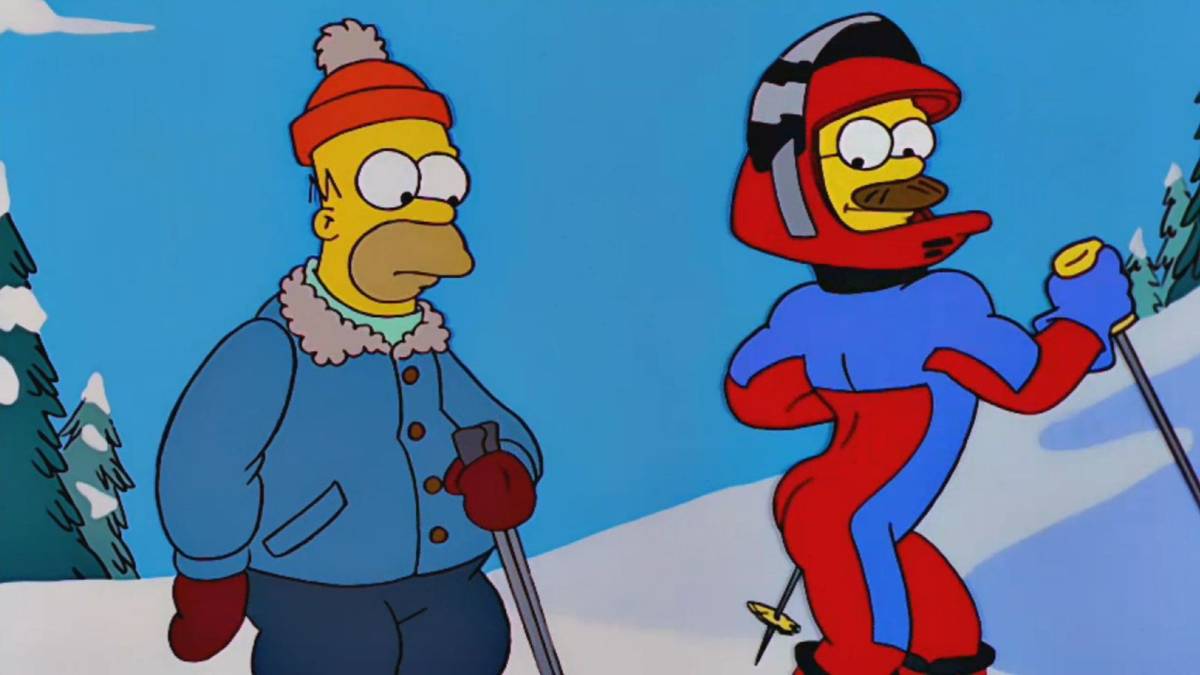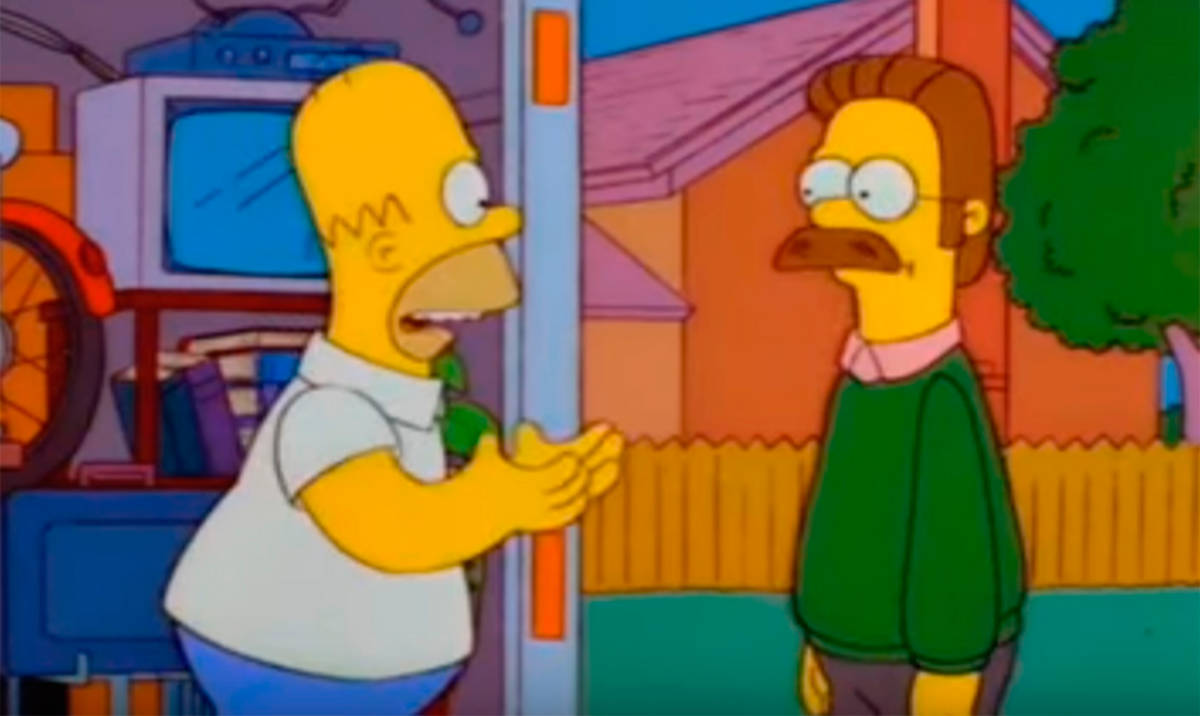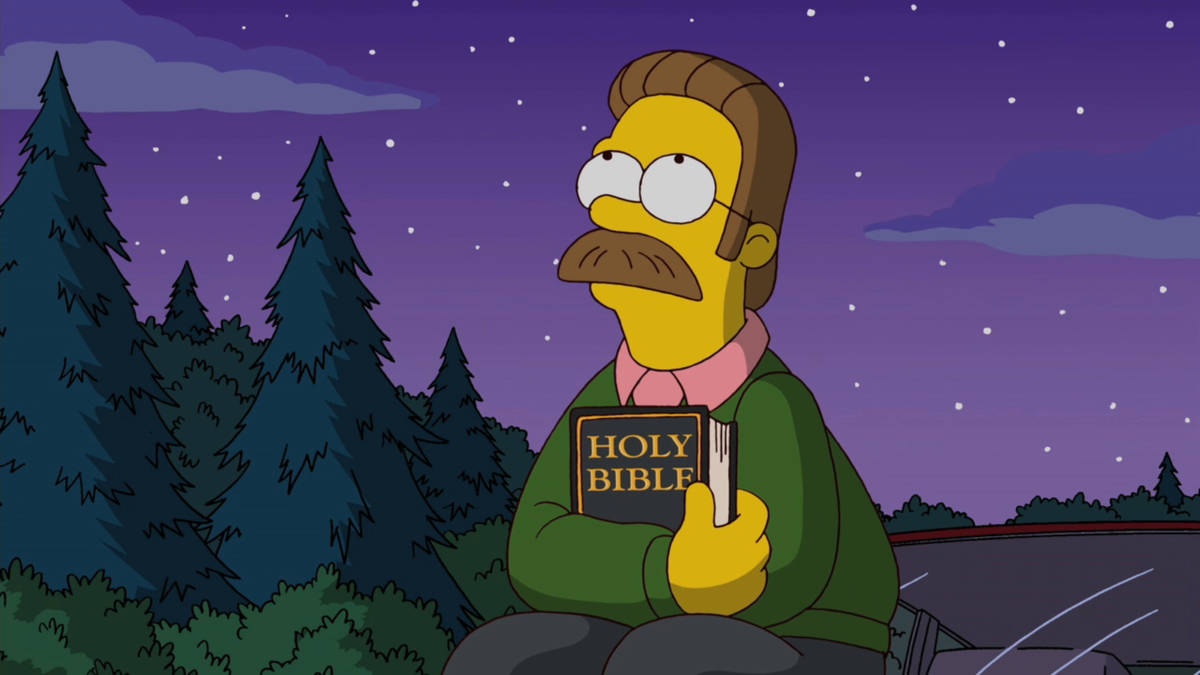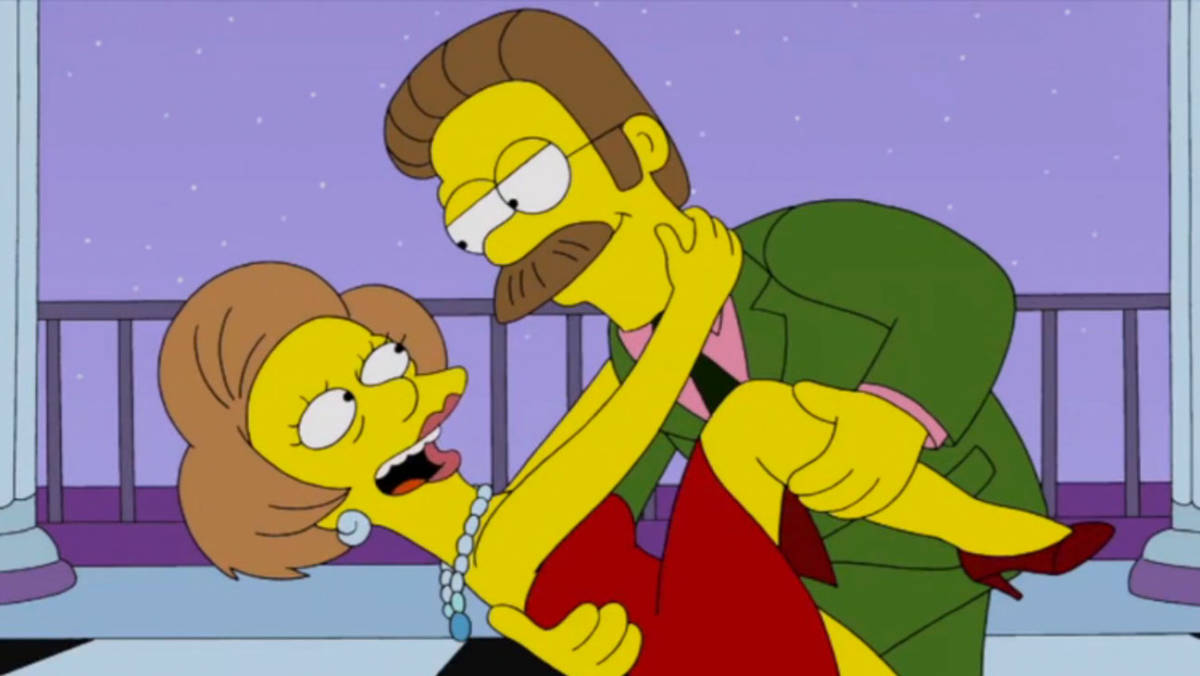It was Ned Flanders who the common vernacular reached for to name the process of ‘Flanderisation’ – the trope of a single aspect of fictional characters’ personalities becoming inflated over the years, until there’s nothing else left. Flanders was a particularly striking example of this, starting off as an upstanding American citizen who was slightly pious in an old-fashioned, white-picket-fence kind of way, only to basically become a religious nut – by turns either a caricature of the Christian right, or otherwise a wet blanket who helplessly deferred to Reverend Lovejoy in everything he does (“I…I think I may be coveting my own wife!”).
Ned’s original incarnation as a pillar of the community was, of course, filtered through the lens of our protagonist, Homer, who found himself upstaged as patriarch by Ned at every turn – Ned was a better provider, a better role model to his children, in much better shape physically, and, as Homer himself would furiously admit to him, “your wife’s butt is higher than my wife’s butt”. Ned was, by and large, cheerfully oblivious to the way he showed up his neighbour, which could have been played as greasy, faintly sinister smugness (and doubtless would have on the more cynical shows that followed in The Simpsons’ wake) but, at worst, seemed a little too good to be true. If the viewer disliked him, it was through seeing a bit of themselves in Homer and a bit of some object of jealousy in Ned.

Complicating the Homer-Ned dynamic was Marge’s relationship with Ned. Later, worse episodes would sometimes have a level of adulterous attraction in play, but at first, Marge and Ned simply got on as well as you’d expect from generally decent neighbours. To Homer’s consternation, Marge would almost invariably sympathise more with Ned when Homer got into some profoundly silly dispute with him (“There you go again, always taking someone else’s side. Flanders, the water department, God…”).
Ironically considering what would later become of him, at this point in The Simpsons’ chronology, it was Ned’s wife, Maude, who tended to serve as a Puritanical, busy-bodying religious type, gleefully joining in with Marge’s crusade against cartoon violence and then disgusted to find out Marge wouldn’t also support the censorship of Michelangelo’s David (“I told you she was soft on full frontal nudity!”). Just as Ned was largely oblivious to Homer’s burning resentment, he also seemed effectively blind to Maude’s seldom-seen but definite nasty streak.
For all that Family Guy was leaning on The Simpsons for inspiration, its vision of cartoon suburbia lacked the better-off neighbour archetype, opting instead for a more King Of The Hill-style central group of four guys having a beer and shooting the shit. Bill Burr’s recent F Is For Family, on the other hand, had an exemplary better-off neighbour in Vic, a perpetually zen dude-type with a plum job on the radio and a string of gorgeous girlfriends. That said, Vic is not a dead-on analogy for Ned – rather than competing with the patriarch-protagonist on the same field (and outdoing him there), Vic is more of an aspirational male fantasy made flesh. Appropriately enough, this provides Vic’s feet-of-clay moment in the first season finale, when he confesses to jealousy of Frank’s family togetherness on Christmas.
The first crack in Ned’s immaculate image came in, appropriately enough, the episode ‘When Flanders Failed’, where Homer wished for Ned’s left-handed store to fail – initially happy to see just that happening, even helping it along, until ultimately realising he’d gone too far when Ned nearly lost his house. Still, even if this temporarily placed Homer in a position of power, the dynamic remained largely the same – the first real sea change to their relationship, and to Ned’s character, came in ‘Homer Loves Flanders’, the episode that gave this essay its title (“What’d he say?”/”I don’t know, something about being gay”). While this featured a sublime example of everything being back to normal at the end, it did introduce Homer’s habit of taking advantage of Ned’s good nature.
There had been hints of this before – in ‘When Flanders Failed’, Homer bought up a good amount of Ned’s furniture at rock-bottom prices, and half the tools and appliances in the Simpsons home bear a ‘property of Ned Flanders’ sticker. Further, Ned was by nature the generous type, possibly best illustrated by an exchange from ‘Homer’s Triple Bypass’ – the two run into each other in hospital, where Ned has been donating a lung and a kidney, and says “if I could give you my heart, Homer, I would” (Homer curtly replies “shut up, Flanders”). Still, it is hard to imagine Ned as originally conceived laughing off Homer’s scheme to give his “noggin a floggin’” with a lead pipe and steal his tickets to the big game. Nor to have him simply sit there like the great stone face as Homer climbed in through the window and helped himself to their Sunday dinner.

Ned was always obliging, but originally, he wasn’t completely spineless – in ‘Dead Putting Society’, Homer did eventually become rude enough that Ned asked him to leave (then felt deeply guilty about it, and wrote to apologise). And even in ‘Homer Loves Flanders’ itself, Homer’s profoundly irritating friendship eventually became wearing enough that Ned snapped at him – in church, no less.
This interstitial stage of Ned’s character is, in isolation, weirdly reminiscent of the Simpsons’ trip to the Amish country (where a guffawing Homer smeared the locals with ice cream, merrily crowing “They’re still not fighting back!”), or alternatively like A Clockwork Orange’s Alex DeLarge post-Ludovico treatment, unable to raise a hand to defend himself. And this wasn’t limited to his relationship with Homer – presumably while on holiday, when he woke in the middle of the night to find Abraham Simpson stealing his powerboat, he cheerfully handed over the keys and announced to his wife and sons that they would “have a camp out in the dinghy”.
When Homer defended Ned at the climax of ‘Homer Loves Flanders’, he observed ‘this man has turned every cheek on his body’. And it’s a pretty accurate summation – Homer has indeed lashed out at Ned on many occasions, only to be met with continued love and tolerance. In a way, this is less an interstitial stage of Ned’s character, than it is some weird mutation along the road to being a religious kook – where the emphasis of one specific Christian value, rather than Christian values generally, creates a weird beast all of its own.
An explanation for this side of Ned’s psyche came in ‘Hurricane Neddy’, where we learn that he misbehaved as a young child. Having tried nothing and all out of ideas, his parents enrolled him in an experimental ‘spankological protocol’, in which he was spanked continuously for eight months. After this, we are told, he would repress all feelings of anger, only able to express it through his trademark ‘diddly-doodly’ babbling – which surely explains why Homer sees quite so much of it.
Of course, ‘Hurricane Neddy’ would also see the Ned who would turn every cheek in his body fall dramatically from his pedestal. This happened after he found himself on the receiving end of a string of Job-style injustices – his house was destroyed by a hurricane, and then he suffered the indignity of having the community build him a bizarre, ramshackle Wendy House which then immediately also collapsed. Like Job, he remained unwilling to turn on the almighty – instead launching a furious tirade against his friends and neighbours (“You ugly, hate-filled man!”/”Hey, I may be ugly and hate-filled, but…um, what was that third thing he said?”).
Realising immediately he had gone too far, Ned then checked himself in at the funny farm. This brought the revelation about the ‘spankological protocol’ he suffered, and ultimately, the deep resentment he felt towards his parents, not for the borderline abuse they prescribed him, but for being ‘lousy beatniks’. Ned, like so many of us, is obviously a product of his upbringing – his parents’ laissez-faire attitude to parenting and incessant be-bop poetry seem to have caused Ned to become a kind of anti-rebel, just as it is the right-on culture of Silicon Valley that has spawned so many neoreactionaries.
Curiously, the first instance of Ned being presented as religious and nothing else came in the season before ‘Homer Loves Flanders’. In season 4, ‘The Front’ had a brief, Looney Tunes-style short after the episode proper, titled ‘The Adventures Of Ned Flanders’ – this week’s episode, ‘Love That God’. It’s the kind of deliberately tedious content The Simpsons always excelled at (“let me be blunt – is there a labour crisis in America today?”), centring on the Flanders boys boldly claiming they’re not going to church today. Ned is naturally shocked and furious, only to instantly snap back into his usual cheeriness when reminded that it’s Saturday.

Still, while in these early days he could be overbearingly religious, this had less of the zealot about it, and more of just being a bit of a square. And sometimes, not even that. Bart and pals were quite taken with Ned’s homemade Bible-themed baseball cards – with Nelson being particularly captivated by a Methuselah rookie card – only to beat a hasty retreat when it turned out they involved religion and learning. Contrast latter-day episodes, where we would see Ned campaign against gay marriage and for the censorship of television, presented in that bloodless, laboured way that barely even qualifies as satire. Even as early as season 8, ‘In Marge We Trust’ anachronistically claimed that Ned’s long history of badgering Reverend Lovejoy for moral guidance was what caused the Reverend to simply stop caring (“Luckily, by then it was the ‘80s, and no-one noticed”).
Flanders’ descent into unbearable piety came in earnest at about the same time the show as a whole suffered a decline that would never be reversed (which even the creators and showrunners openly admit, if they don’t think anyone’s listening). Yet, to the show’s credit, it could still occasionally set it aside for the purposes of the plot. For instance, in season 10’s ‘Viva Ned Flanders’, Ned worries that he’s boring (having attributed his youthfulness to, among other things, “a daily dose of vitamin church” – clearly having become more radicalised since ‘Love That God’) and enlists Homer to show him how to live life to its fullest.
This was possibly a more complete destruction of Ned’s character than any amount of religious priggishness could accomplish – Ned was always fond of Homer, but jealous? Not in two thousand years. This is the opposite of the dynamic that made both characters so universally relatable. It also hints towards how Homer’s characterisation slid from ‘local oaf’ to ‘Captain Wacky’ – Homer as a character was never meant to live life to its fullest, we know this. In season 2, having narrowly cheated death by fugu poisoning, Homer declared he would live life to its fullest – smash cut to him, watching bowling highlights, eating pork rinds, and happy as a clam.
The final major change to Ned’s character – or at least, to his circumstances – was Maude’s death in the clunkily named ‘Alone Again, Natura-Diddily’. This was also rooted in the show as a whole falling apart, as it stemmed almost entirely from Fox, who to this day make money hand over fist from the franchise, not wanting to pay Maggie Roswell’s travel expenses. (Part of what originally made The Simpsons great was that the executives absolutely did not get to dictate what went into the scripts.) In a particularly callous development, Ned was back in the dating pool before the third act. But most importantly, once again, we were left with the upside-down scenario of Ned envying Homer – and as Lisa once noted, “a man who envies our family is a man who needs help”.
By that point, though, help wasn’t forthcoming – certainly not from the writers. With real life writing the plot, certainly they were constrained from the off. However, this is no excuse for the writers’ story of having to awkwardly cut a scene in which Flanders talks to Rod and Todd about their mother’s death, as it turned out there’s really no way of making that funny. Which begs the question – why write the thing in the first place?
https://www.youtube.com/watch?v=Pm6h9YRCMqM
In fact, that could be extended to the entirety of ‘Alone Again, Natura-Diddily’. The Simpsons had had characters quietly killed off before – psychologist Marvin Monroe’s death was first alluded to by a passing mention of a ‘Marvin Monroe memorial hospital’. And killing off a character because of a dispute with the voice actor is particularly ironic, given that Ned once had a line where he commented that, when cartoons replace their underpaid voice actors, “no-one can can tell the diddly-ifference” – voiced incongruously by Karl Wiedergott. Indeed, ‘Alone Again, Natura-Diddily’ had already done this by bringing in Marcia Mitzman Gaven to briefly voice Maude before she met with tragedy.
Granted, replacing Maggie Roswell would have been seen as yet another sign of decay by the fanbase – but by then, most anything would have, and it wouldn’t have carried the distasteful sting of their later revival and recasting of the character Lunchlady Doris, many years after Doris Grau had passed away. Typically, even after the decline, the show had the courtesy to let the characters of deceased voice actors respectfully retire – hence the disappearance of Lionel Hutz, Troy McClure, and Mrs Krabappel. (In a particularly cruel twist of fate, in season 22/23 Ned would get remarried to Mrs Krabappel, shortly before Marcia Wallace’s death and the character’s retirement.)
For all that Ned was a square, even before his rebirth as a religious extremist, he was at his core a good man. To go back to The Simpsons’ grittier imitators (naming no Seth MacFarlane properties), not a one of them would have been able to resist the temptation to undercut a holier-than-thou figure like Ned, to give them some moment of duplicity or even sadism – the nearest The Simpsons ever came was a throwaway plotline about Ned being a Beatles fan on the basis that “they were bigger than Jesus”.
https://www.youtube.com/watch?v=K0IAjQsfYaY
But Ned, on the whole, remained decent even in the most trying of times. In season 4’s ‘Homer the Heretic’, when Homer renounced religion and accidentally burnt the house down while skipping church, it was Ned who braved the flames to rescue him (while, it seems, skipping church himself, which would have been unthinkable to the later Ned). And then in ‘Bart’s Comet’, we had the high-water mark of Ned – in the face of armageddon from above, and having had his ‘shelter-ini’ invaded and filled over capacity by the rest of the townspeople – calmly agree to sacrifice himself to save everyone else.
Bear in mind, this wasn’t a Treehouse of Horror, or dream sequence – this was canon. Perhaps a comet nearly destroying Springfield is a pretty zany plot by the standards of the show’s golden years. However, this doesn’t detract from the power of Ned’s action – nor the power of Homer (of all people) becoming overcome with guilt, and leaving the shelter to stand by Ned’s side. Again, a lot of latter-day animated shows simply wouldn’t have been able to let these moments of sincerity simply be, at least not without undercutting them with a tactless, shoehorned-in punchline. They could not have had Ned sacrifice himself. They could not have had Homer’s passionate defence of Ned in ‘Homer Loves Flanders’. They certainly could not have ended an episode with the Simpsons and Flanderses coming together to sing ‘Put on a Happy Face’.
Sadly – and without wishing to harp on a point – these days, The Simpsons wouldn’t have any of these moments either, and the reason is because there’s no reason to be sincere about what Ned Flanders has become. The problem with his character’s mutation isn’t the religious stuff itself, it’s the way that focusing entirely on one character trait has left him paper-thin. Ned as originally conceived was recognisable as a real person, but that Ned is as dead as Maude – these days he’s little better than a strawman conservative from some unfunny political cartoon – and we are poorer for it.
Some of the coverage you find on Cultured Vultures contains affiliate links, which provide us with small commissions based on purchases made from visiting our site.

